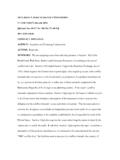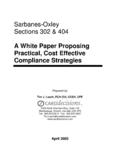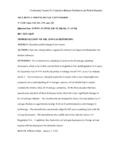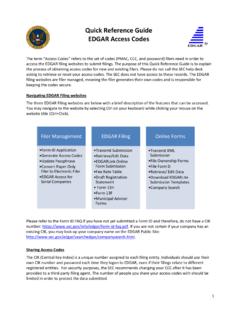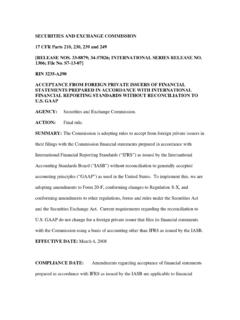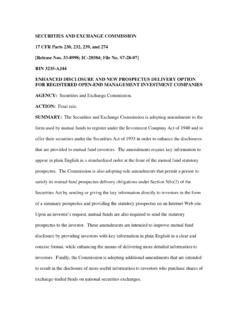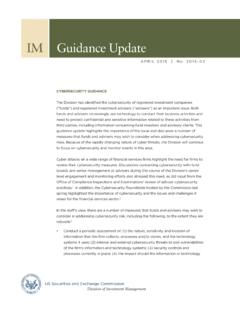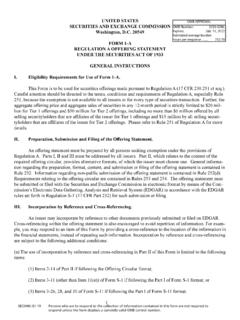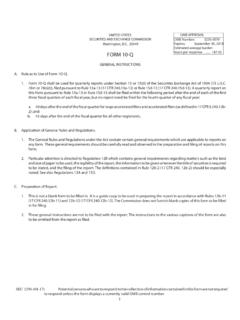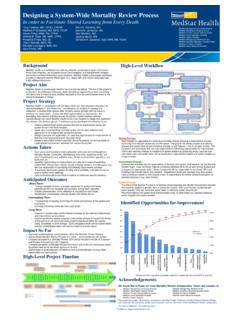Transcription of Regulation of Investment Advisers - SEC.gov
1 Regulation of Investment Advisers by the Securities and Exchange Commission March 2013. staff of the Investment adviser Regulation Office Division of Investment Management Securities and Exchange Commission Regulation of Investment Advisers by the Securities and Exchange Commission *. I. Introduction Money managers, Investment consultants, and financial planners are regulated in the United States as Investment Advisers under the Investment Advisers Act of 1940. ( Advisers Act or Act ) or similar state statutes. This outline describes the Regulation of Investment Advisers by the Securities and Exchange Commission ( SEC ). The Advisers Act is the last in a series of federal statutes intended to eliminate abuses in the securities industry that Congress believed contributed to the stock market crash of 1929 and the depression of the 1930s. The Act is based on a congressionally-mandated study of Investment companies, including consideration of Investment counsel and Investment advisory services, carried out by the SEC during the 1930s.
2 1 The SEC's report traced the history and growth of Investment Advisers and reflected the position that Investment Advisers could not properly perform their function unless all conflicts of interest between them and their clients were removed. The report stressed that a significant problem in the industry was the existence, either consciously or, more likely, unconsciously, of a prejudice by Advisers in favor of their own financial interests. The SEC's report culminated in the introduction of a bill that, with some changes, became the Advisers Act. The Act, as adopted, reflects congressional recognition of the delicate fiduciary nature of the advisory relationship, as well as Congress' desire to eliminate, or at least expose, all conflicts of interest that might cause Advisers , either consciously or unconsciously, to render advice that is not disinterested. 2. The outline that follows is divided into five sections, each of which addresses a different question: Who is an Investment adviser ?
3 Which Investment Advisers must register with the SEC? Who must register under the Act? How does an Investment adviser register under the Act? What are the requirements applicable to an Investment adviser registered under the Act? *. The Securities and Exchange Commission, as a matter of policy, disclaims responsibility for any private publication or statement by any of its employees. The views expressed in this outline are those of the staff of the Investment adviser Regulation Office, and do not necessarily reflect the views of the Securities and Exchange Commission or others on the staff of the Securities and Exchange Commission. The Investment adviser Regulation Office would like to thank Robert E. Plaze, the original author of this outline, for his substantial contribution. 1. See Investment Trusts and Investment Companies, Report of the Securities and Exchange Commission, Pursuant to Section 30 of the Public Utility Holding Company Act of 1935, on Investment Counsel, Investment Management, Investment Supervisory and Investment Advisory Services, Doc.
4 No. 477, 76th Cong., 2d Sess. (1939). 2. SEC v. Capital Gains Research Bureau, Inc., 375 180, 189, 191-192 (1963). 1. II. Who is an Investment adviser ? A. Definition of Investment adviser Section 202(a)(11) of the Act defines an Investment adviser as any person or firm that: for compensation;. is engaged in the business of;. providing advice to others or issuing reports or analyses regarding securities. A person must satisfy all three elements to fall within the definition of Investment adviser , which the SEC staff has addressed in an extensive interpretive release explaining how the Act applies to financial planners, pension consultants and other persons who, as a part of some other financially related services, provide Investment advice. 3 Published in 1987, Investment Advisers Act Release No. 1092 represents the views of the Division of Investment Management, which is primarily responsible for administering the Act. 1. Compensation. The term compensation has been broadly construed.
5 Generally, the receipt of any economic benefit, whether in the form of an advisory fee, some other fee relating to the total services rendered, a commission, or some combination, satisfies this element. 4 The person receiving the advice or another person may pay the compensation. 2. Engaged in the Business. A person must be engaged in the business of providing advice. This does not have to be the sole or even the primary activity of the person. Factors used to evaluate whether a person is engaged are: (i) whether the person holds himself out as an Investment adviser ; (ii). whether the person receives compensation that represents a clearly definable charge for providing Investment advice; and (iii) the frequency and specificity of the Investment advice provided. 5 Generally, a person providing advice about specific securities will be engaged in the business . unless specific advice is rendered only on a rare or isolated occasion. 6. 3. Applicability of the Investment Advisers Act of 1940 to Financial Planners, Pension Consultants, and Other Persons Who Provide Others with Investment Advice as a Component of Other Financial Services, Investment Advisers Act Release No.
6 1092 (Oct. 8, 1987) ( Release 1092 ). 4. Id.; see also Kenisa Oil Company, SEC staff No-Action Letter (May 6, 1982); SEC v. Fife, 311 F. 3d 1 (1st Cir. 2002) (a person provides advice for compensation if it understands that successful Investment will yield it a commission); In the Matter of Alexander V. Stein, Investment Advisers Act Release. No. 1497 (June 8, 1995) (a person receives compensation if it fraudulently converts client funds to its own use). 5. Zinn v. Parish, 644 360 (7th Cir. 1981); Release 1092, supra note 3. 6. For instance, the SEC staff would not view an employer providing advice to an employee in connection with an employer-sponsored employee benefit program to be in the business of providing advice, see Letter to Olena Berg, Assistant Secretary, Department of Labor, from Jack W. Murphy, Chief Counsel, Division of Investment Management, SEC (Feb. 22, 1996). See also Zinn, supra note 5 at 364. ( isolated transactions with a client as an incident to the main purpose of his management contract to negotiate football contracts do not constitute engaging in the business of advising others on Investment securities.)
7 2. 3. Advising Others about Securities a. Advice about Securities. A person clearly meets the third element of the statutory test if he provides advice to others about specific securities, such as stocks, bonds, mutual funds, limited partnerships, and commodity pools. The SEC staff has stated that advice about real estate, coins, precious metals, or commodities is not advice about securities. 7 The more difficult questions arise with less specific advice, or advice that is only indirectly about securities. The SEC staff has stated in this regard: (i) advice about market trends is advice about securities; 8. (ii) advice about the selection and retention of other Advisers is advice about securities; 9. (iii) advice about the advantages of investing in securities versus other types of investments ( , coins or real estate) is advice about securities; 10. (iv) providing a selective list of securities is advice about securities even if no advice is provided as to any one security; 11 and (v) asset allocation advice is advice about securities.
8 12. b. Advising Others. Questions about whether a person advises others . usually arise when a client is not a natural person. The SEC staff generally looks to the substance of the arrangement rather than its form: (i) A general partner of a limited partnership that provides advice with respect to the investments of partnership assets is advising others (the limited partners) even where the general partner may have legal title to these assets. 13. 7. Robert R. Champion, SEC staff No-Action Letter (Sept. 22, 1986). 8. Dow Theory Forecasts, SEC staff No-Action Letter (Feb. 2, 1978). Thus, market-timing advice is advice about securities. See Maratta Advisory, Inc., SEC staff No-Action Letter (July 16, 1981). 9. Release 1092, supra note 3; FPC Securities Corp., SEC staff No-Action Letter (Dec. 1, 1974). See also SEC v. Bolla, 401 43 ( 2005), aff'd. in relevant part, SEC v. Washington Investment Network, 475 392 ( Cir. 2007) (person selecting Investment Advisers for clients meets the Advisers Act's definition of Investment adviser ).
9 10. Release 1092, supra note 3. 11. RDM Infodustries, Inc., SEC staff No-Action Letter (Mar. 25, 1996). The SEC staff takes the position that providing information about securities in a report does not constitute providing advice about the securities if: (i) the information is readily available to the public in its raw state; (ii) the categories of information presented are not highly selective; and (iii) the information is not organized or presented in a manner that suggests the purchase, holding, or sale of any security. See id. 12. Maratta Advisory, Inc., supra, note 8. See also SEC v. Bolla, supra, note 9. 13. Abrahamson v. Fleschner, 566 862, 870 (2d Cir. 1977), cert. denied, 436 913 (1978); SEC v. Haligiannis, 470 F. Supp. 2d 373, 383 ( 2007). 3. (ii) A wholly-owned corporate subsidiary exclusively advising the parent or another wholly owned corporate subsidiary would not generally be considered advising others. 14. c. Investment Banking. The SEC staff does not believe that the Act applies to persons whose activities are limited to advising issuers concerning the structuring of their securities offerings (although such advice may technically be about securities).
10 15. d. Clients. The Act is silent regarding whether the clients must be persons. The SEC takes the position that a person providing advice exclusively to persons would still be subject to the Act. 16. B. Exclusions from Definition There are several exclusions from the Investment adviser definition available to persons who presumably (or at least arguably) satisfy all three elements of the definition. A person eligible for one of the exclusions is not subject to any provisions of the Act. 1. Banks and Bank Holding Companies. This exclusion is generally limited to banks and bank holding companies. 17 The SEC staff has stated that the exclusion is unavailable to banks, 18 credit unions, and Investment adviser subsidiaries of banks or bank holding companies. 19. 2. Lawyers, Accountants, Engineers, and Teachers. The professional exclusion is available only to those professionals listed, and only if the advice given is incidental to the practice of their profession. Factors considered by staff to evaluate whether advice is incidental to a profession are: (i) whether the professional holds himself out as an Investment adviser ; (ii) whether the advice is reasonably related to the professional services provided; and (iii).

